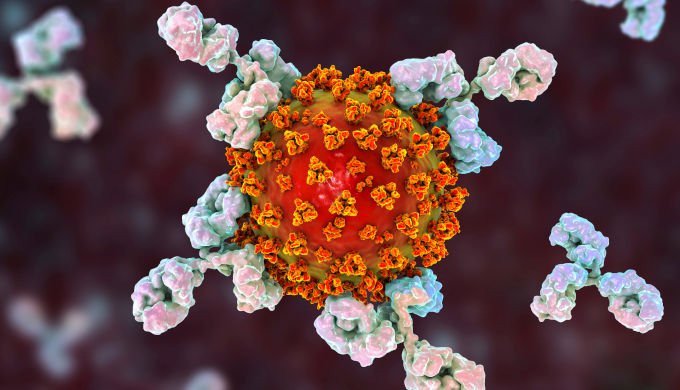Author: Shreeya Nanda
medwireNews: A Canadian population-based study has confirmed that people with cancer have an increased risk of breakthrough COVID-19 infection after vaccination, while UK research points to the feasibility of SARS-CoV-2 antibody testing to identify those with the lowest level of vaccine-derived protection.
The first study included data from linked administrative databases in Ontario, Canada, on 289,400 patients with cancer and 1,157,600 matched cancer-free individuals who received at least two doses of a COVID-19 vaccine between 9 December 2020 and 17 December 2021, where the matching was based on age, sex, type of vaccine and date of vaccination.
As reported in JAMA Oncology, the risk of breakthrough SARS-CoV-2 infection 14 days after the second vaccine dose was significantly higher for people with versus without cancer, at an adjusted hazard ratio (HR) of 1.05. This was driven primarily by a significantly increased risk among patients with haematological cancers (n=39,880; adjusted HR=1.33), whereas there was no such increase among those with solid tumours (n=249,520).
Individuals with cancer also had a significantly elevated risk of worse COVID-19-related outcomes than their counterparts without cancer. Specifically, the adjusted HRs for emergency department visits, severe outcomes (defined as hospitalisation or death) and death within 4 weeks of a positive SARS-CoV-2 PCR test were 1.28, 1.52 and 1.60, respectively.
The risks were more pronounced in the haematological cancer cohort, with corresponding adjusted HRs of 2.54, 2.51 and 2.32, and even the solid tumour cohort had a significantly increased risk of severe outcomes and death, at HRs of 1.29 and 1.43, respectively.
Furthermore, both haematological and solid cancer patients undergoing active chemotherapy had a significantly elevated risk for all three outcome endpoints relative to cancer-free individuals, with haematological cancer patients also having a significantly higher risk of breakthrough infection.
Of note, receipt of a third vaccination “was associated with lower infection and COVID-19 complications” in the overall study population and all subgroups, with the sole exception of haematological cancer patients receiving anti-CD20 therapy, highlight Matthew Cheung (University of Toronto, Ontario) and co-authors.
The researchers say that their study “corroborates and builds on recently published studies addressing COVID-19 vaccine outcomes in the cancer population.”
And the team concludes: “Our findings support the prioritization of high-risk populations for booster vaccination, forthcoming variant-specific vaccine products, preexposure prophylaxis (where available), and rapid antiviral treatment in the face of SARS-CoV-2 infection as COVID-19 continues to be relevant with ongoing surges leading to excess morbidity and mortality.”
The authors of the second study drew on the UK National COVID Cancer Antibody Survey to identify 3555 patients with cancer who received two or more doses of a COVID-19 vaccine between 1 September 2021 and 4 March 2022 and underwent SARS-CoV-2 antibody testing during the study period.
The control group, which comprised 225,272 cancer-free individuals, was drawn from an antibody testing programme for essential workers, including education, healthcare and social care staff.
In all, there were 4249 antibody test results available for the cancer group and 294,230 results for the control group. A total of 2313 tests in the former group and 230,417 in the latter group were performed after the second vaccination dose, while 1936 and 63,813, respectively, were after the third dose.
Lennard Lee (University of Oxford) and colleagues report in JAMA Oncology that a significantly greater proportion of individuals with cancer than without had an undetectable antibody response, at rates of 4.68% and 0.13%, respectively.
And among people with cancer, the rates of breakthrough COVID-19 infection were significantly higher for those with versus without an undetectable antibody response, at a respective 13.57% and 5.73%. This equated to a significant 3.05-fold increased risk of breakthrough infection after adjustment for age, sex, ethnicity and deprivation levels.
The incidence of COVID-19-related hospitalisation was also significantly greater for people with undetectable antibodies, at a rate of 6.03% compared with 1.06% for those with detectable antibodies, and a hazard ratio after adjustment of 6.48.
“Sensitivity analyses confirmed that this risk was observed regardless of whether a third dose had been received and whether the individual had a blood cancer or solid cancer diagnosis”, write the researchers.
Discussing the results, the team suggests that prevention of SARS-CoV-2 infection “should be prioritized” among those with the lowest level of antibody-derived protection “to minimize impact on their cancer treatments.”
Lee et al continue: “Antibody testing could empower these individuals to take additional preventive measures to reduce their risk of infection.
“Further expansion of antibody testing to prioritize measures, such as preexposure prophylaxis, vaccination boosters, and early treatment programs, may help mitigate the direct impact on this group as well as the indirect impact arising from delays to effective cancer care.”
medwireNews is an independent medical news service provided by Springer Healthcare Ltd. © 2023 Springer Healthcare Ltd, part of the Springer Nature Group
10 January 2023: The coronavirus pandemic is affecting all healthcare professionals across the globe. Medicine Matters’ focus, in this difficult time, is the dissemination of the latest data to support you in your research and clinical practice, based on the scientific literature. We will update the information we provide on the site, as the data are published. However, please refer to your own professional and governmental guidelines for the latest guidance in your own country.
JAMA Oncol 2022; doi:10.1001/jamaoncol.2022.6815
JAMA Oncol 2022; doi:10.1001/jamaoncol.2022.5974
Image Credits: © Kateryna_Kon / stock.adobe.com



